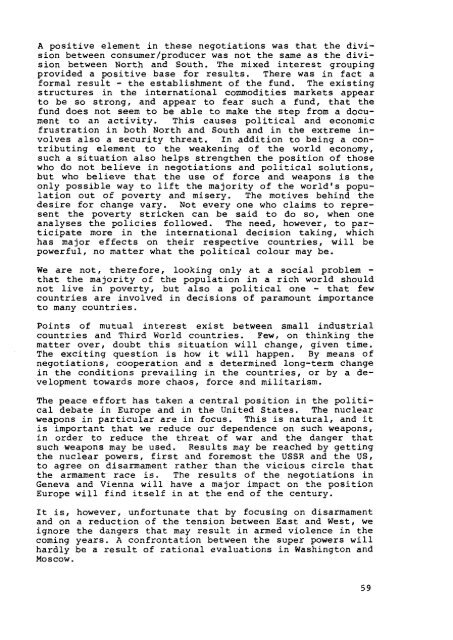Ifda dossier 47, May/June 1985
Ifda dossier 47, May/June 1985
Ifda dossier 47, May/June 1985
Create successful ePaper yourself
Turn your PDF publications into a flip-book with our unique Google optimized e-Paper software.
A positive element in these negotiations was that the divi-<br />
sion between consumer/producer was not the same as the divi-<br />
sion between North and South. The mixed interest grouping<br />
provided a positive base for results. There was in fact a<br />
formal result - the establishment of the fund. The existing<br />
structures in the international commodities markets appear<br />
to be so strong, and appear to fear such a fund, that the<br />
fund does not seem to be able to make the step from a docu-<br />
ment to an activity. This causes political and economic<br />
frustration in both North and South and in the extreme in-<br />
volves also a security threat. In addition to being a con-<br />
tributing element to the weakening of the world economy,<br />
such a situation also helps strengthen the position of those<br />
who do not believe in negotiations and political solutions,<br />
but who believe that the use of force and weapons is the<br />
only possible way to lift the majority of the world's popu-<br />
lation out of poverty and misery. The motives behind the<br />
desire for change vary. Not every one who claims to repre-<br />
sent the poverty stricken can be said to do so, when one<br />
analyses the policies followed. The need, however, to par-<br />
ticipate more in the international decision taking, which<br />
has major effects on their respective countries, will be<br />
powerful, no matter what the political colour may be.<br />
We are not, therefore, looking only at a social problem -<br />
that the majority of the population in a rich world should<br />
not live in poverty, but also a political one - that few<br />
countries are involved in decisions of paramount importance<br />
to many countries.<br />
Points of mutual interest exist between small industrial<br />
countries and Third World countries. Few, on thinking the<br />
matter over, doubt this situation will change, given time.<br />
The exciting question is how it will happen. By means of<br />
negotiations, cooperation and a determined long-term change<br />
in the conditions prevailing in the countries, or by a de-<br />
velopment towards more chaos, force and militarism.<br />
The peace effort has taken a central position in the politi-<br />
cal debate in Europe and in the United States. The nuclear<br />
weapons in particular are in focus. This is natural, and it<br />
is important that we reduce our dependence on such weapons,<br />
in order to reduce the threat of war and the danger that<br />
such weapons may be used. Results may be reached by getting<br />
the nuclear powers, first and foremost the USSR and the US,<br />
to agree on disarmament rather than the vicious circle that<br />
the armament race is. The results of the negotiations in<br />
Geneva and Vienna will have a major impact on the position<br />
Europe will find itself in at the end of the century.<br />
It is, however, unfortunate that by focusing on disarmament<br />
and on a reduction of the tension between East and West, we<br />
ignore the dangers that may result in armed violence in the<br />
coming years. A confrontation between the super powers will<br />
hardly be a result of rational evaluations in Washington and<br />
Moscow.
















